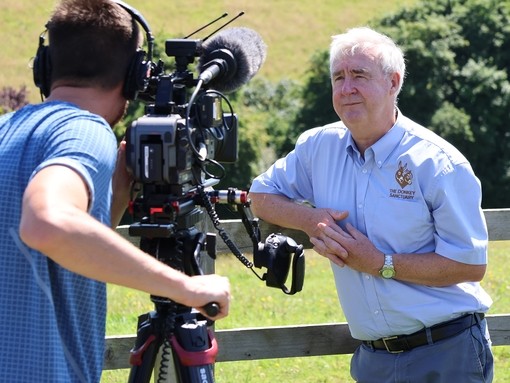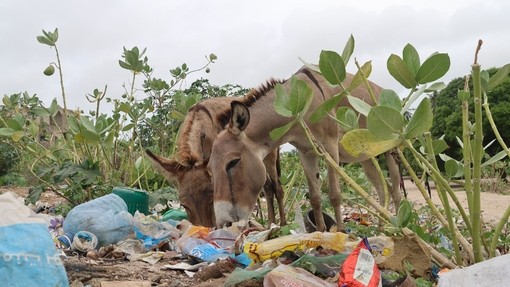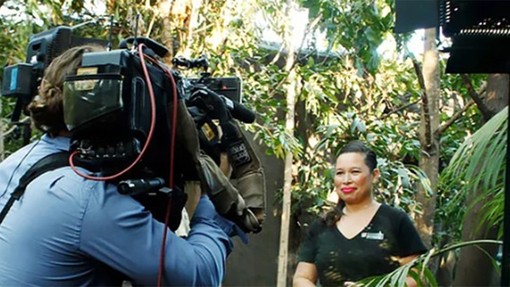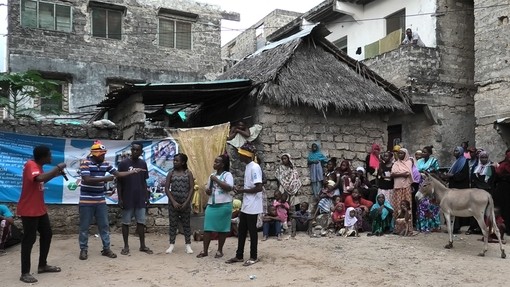
An interview with Peter Wright
Peter Wright will be familiar to viewers of the award-winning Channel 5 television show The Yorkshire Vet, which follows the lives and work of Peter and fellow vet Julian Norton at their practices in North Yorkshire. Peter has been ambassador for The Donkey Sanctuary for five years and is passionate about championing donkeys and their welfare. We sat down with him to find out why donkeys are so special to him and what the “real” James Herriot is like.
Did you always know that you wanted to be a vet?
I hadn’t a clue what I was going to do when I “grew up”! I’d been brought up all my life with animals, to respect them and with a deep love for them. My grandad was the manager at the farm that neighboured where I lived. From as young as five or six years old I would wade in there and offer the cattle food from my hand. I used to think they were befriending me, but it was probably more the fact that I was bribing them with food! Probably true for the sheep and hens too, come to think of it.
So when I was asked about a career in studying veterinary science at 16 years old, I thought that might be quite good. I can use my brain, for what it’s worth, and I can live in the countryside which I adore. My Head of Careers told me that he taught Alf Wight, that’s James Herriot’s son, and said he could fix for me to go and spend a day at the Herriot practice, Skeldale Veterinary Centre. I can honestly say I’d been there probably half an hour and I just fell in love with what was going on in the practice.
It was very busy, phones were going all the time, vets doing operations, people going out onto farms and I thought “this is for me!” Not too long after qualifying from Liverpool University, the calling came to go back to North Yorkshire and the Herriot practice. That was 1982, and I worked there until 2020 and never regretted the move back for a minute.
I’ve always been a mixed practice vet – I love the variety that comes with large animals and going out into communities. That was part of my life, and I wouldn’t have had that with small animals alone.
I wouldn’t have changed anything in how my career panned out and, you know, that’s quite a thing. Not everybody can say that.

You worked alongside famous vet and author James Alfred “Alf” Wight, more widely know by his pen name, James Herriot. How did his influence shape your approach to veterinary care?
Really he was a very humble man, quite a shy man and yet he had a massive influence on my career. He treated everyone the same, with total respect, and I‘ve never heard him raise his voice in anger. That’s the sort of man he was and his partner, Donald Sinclair (better know in the Herriot books as Siegfried Farnon) was a flamboyant character to say the least! He was impulsive, unpredictable, hugely eccentric but humble with it and he was also a great influence on my career. He would often give me advice when I needed it. So my bedrock was there – of working not only with people who really knew their stuff, but also at the Herriot practice which was such a homely place. Often in the afternoon, one of us would put the kettle on and Alf and Donald would share some of the amazing cases and stories from their careers. It was a great honour to work for them.
Can you tell us how the transition from practice vet to TV vet found you?
In 2014 I received an email from Daisybeck Studios, who had been commissioned by Channel 5 to find a practice to share some veterinary stories from in Yorkshire. They wanted a practice with the Herriot ethos and we were modernising at the time. We had purpose-built premises and future-facing techniques, but still with that Herriot ethos of warmth, humour and community.
I was sceptical being getting involved with television if I’m honest. Alf always felt that the media were looking for some kind of angle that didn’t exist – something a Yorkshire man would call “muck-raking”! So initially I said “no”…but I’ve never been one to shirk a challenge and it gnawed away at me that I might later have regrets about walking away from something that was worth doing.
Several months later, in April 2015, Managing Director of Daisybeck Paul Stead came to see me and offered me something I put a lot of faith in – a Yorkshire man’s promise. He promised he wouldn’t let me down and that I could trust him. And 19 series, 20 countries and over 220 episodes later I can confirm that Paul kept to his word.
The thing about The Yorkshire Vet, and one thing I’m very proud of, is that it appeals to children four-years-old through to people in their nineties, and there’s not many TV programmes that do that. Initially, clients and particularly farmers were suspicious about being involved in filming. But as the show became a success, and they could see that no one was there to make fools of them, they embraced it.

Why do you think it’s been so successful?
I honestly didn’t think anybody would watch it – I even told Paul he was wasting his time when we first started filming!
As the show grew in popularity, I said to my wife Lin “why do people watch this stuff?” She replied in true Yorkshire fashion that people weren’t interested in me, they were interested in my patients! Which is true of course, but I think it’s a little bit of everything – the glory of the Yorkshire countryside, the warmth of the community and the characters we meet, and of course the furry stars of the show. I think it’s this long-forgotten wholesomeness that makes the programme what it is. No politics, no violence, no sex (well occasionally, but only from our patients!).
What changes have you seen in veterinary work throughout your career?
The world of human medicine has moved on enormously and I think that society also expect the same quality and advancements in service for their animals too. Going back in time we would have a blood analyser and x-ray machine in the practice, but now we have ultrasounds, CT scanners etc and I think this is the dilemma facing the veterinary profession today. This advancing technology comes at a cost, and it’s about striking a balance between what is achievable and what is affordable enough for people to embrace. In my opinion, we’ve got to make advancements in treatment accessible to everyone.
How did The Donkey Sanctuary come into your life?
In 2018, I was part of a Channel 5 fundraising telethon to support various national animal charities in the UK. I was asked if I would come down to visit The Donkey Sanctuary HQ in Devon. I didn’t really know too much about the charity, but I did know that when we rang up for advice about donkeys as a practice there was always someone incredibly knowledgeable at the end of the phone.
When I arrived and realised the scale at which The Donkey Sanctuary was transforming the lives of donkeys, it was one of the most uplifting experiences I’d had with animals. I don’t think anyone could spend a few hours at The Donkey Sanctuary and not float out of here! After we’d filmed the TV segment, a lady called Dawn came to see me and asked if I would consider becoming the ambassador for The Donkey Sanctuary. I think it probably took me about a hundredth of a second to say “yes please!”
What I didn’t realise at the time was that Dawn was the granddaughter of Dr Elisabeth Svendsen, the founder of The Donkey Sanctuary in 1969. It has been my privilege and pleasure to be the ambassador for The Donkey Sanctuary ever since.
What do donkeys mean to you?
I’ve referred to “the power of animals” in a number of contexts throughout my career, and I think donkeys really do have a special role in that. Donkeys have this great empathy, they can pick up on what people are feeling. They’re gentle and so intelligent. I get it, having worked with animals all my life, but never under-estimate a donkey!
From my very first visit to The Donkey Sanctuary, it’s that sense of belonging that people have with donkeys. It always feels like visiting family when I come back. Staff and supporters take a lot of pride in the work that happens here, quite rightly, and it’s so multi-faceted.

Is there an experience with a donkey from your career that sticks out in your mind?
Around two years ago I was called to see a jenny on the North York moors that had just given birth. Her owner was very concerned. It was a horrible grey day and the baby was bedraggled and hadn’t taken any milk. It’s not always easy to tell when a donkey is about to give birth and the gestation period can vary enormously, so they’d been a little caught out. Time is of the essence at that age and I’d been told that the jenny had had a baby the previous year which had sadly died at two days of age.
The afterbirth was still present, which can be quite dangerous, so I set about removing that straight away. The jenny was looking very forlorn and her milk quality was poor and watery. What you can do in that situation is deliver intravenous immunoglobulins, which is like a super-immune serum, to give babies some initial immunity. But you’ve only got a short period of time to administer this. The baby needs lots of colostrum, mother’s first milk, in the first 5-6 hours to survive. I could see this just wasn’t going to happen, so we set about getting some immunoglobins into the foal and as this little chap started to recover it made my heart soar!
He had to be hospitalised for a short period of time and by some miracle the mother’s milk did improve, so she was able to go on to feed him. But, without that initial action, Elvis (as his owners named him) wouldn’t have made it. I’m delighted to report that Elvis is alive and thriving, in the heart of the North York Moors!
It gives me a great thrill to see him from time to time. In fact you can watch our latest encounter in The Yorkshire Vet: A Donkey for Christmas on Channel 5.
What’s one thing you wish more people know about donkeys?
I do hear occasionally this perception that donkeys are stubborn, stupid animals. It has been my privilege to discover through my work with The Donkey Sanctuary just how inquisitive and intelligent donkeys are. They study things and have so much to offer.
When you look across the world at how vital they are to communities – so many families couldn’t function without a donkey, so it’s critically important that these animals are kept in good health. I don’t think people appreciate the amount of work that The Donkey Sanctuary does across the world in promoting the welfare of donkeys and working with owners to give them a good quality of life. I think we need to understand the role of the donkey, not just in this country, but across the world.
Share this page
Tags
- Blog





